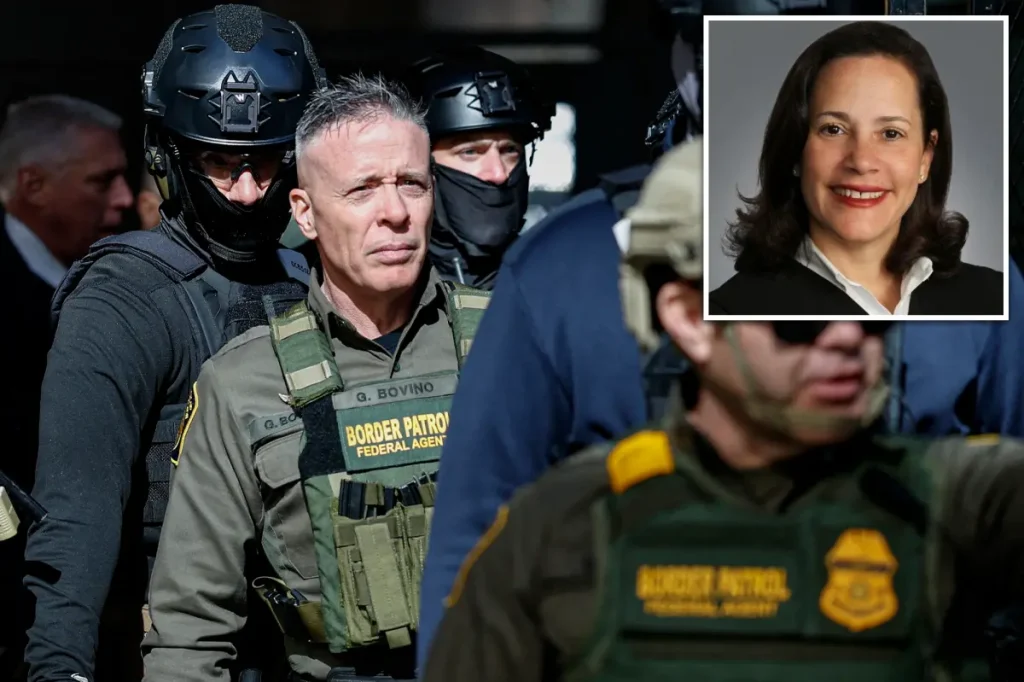Federal Judge’s Border Patrol Order Temporarily Halted by Appeals Court
In a significant development in the ongoing immigration enforcement saga, a federal appeals court has temporarily suspended an unusual judicial order that would have required Border Patrol Commander Greg Bovino to deliver daily in-person updates on Chicago immigration operations. The original directive, issued by Obama-appointee Judge Sara Ellis, would have mandated Bovino to appear at the Northern Illinois District Court every weekday evening at 5:45 PM to provide briefings on the controversial “Operation Midway Blitz.” This judicial requirement reflected growing tensions between federal immigration enforcement activities and the courts, particularly as concerns mount about the treatment of protesters opposing these operations. Judge Ellis’s order came after she expressed worry that federal agents were not complying with a previous temporary restraining order that prohibited the use of chemical agents like tear gas and pepper spray against protesters, journalists, and clergy members.
The Department of Justice quickly challenged this unprecedented requirement, filing an appeal with the 7th Circuit Court of Appeals mere hours before Bovino’s first scheduled court appearance. In their filing, DOJ lawyers argued that forcing such a high-ranking official to make daily court appearances would substantially disrupt immigration enforcement operations in Chicago. The Justice Department’s appeal framed Judge Ellis’s order as judicial overreach, stating that it “significantly interferes with the quintessentially executive function of ensuring the Nation’s immigration laws are properly enforced by waylaying a senior executive official critical to that mission on a daily basis.” The DOJ further contended that the district court had exceeded its judicial authority by attempting to “supervise and micromanage” the day-to-day operations of an executive branch law enforcement agency.
The contested order was part of a broader judicial directive requiring U.S. Customs and Border Protection to provide comprehensive documentation of its enforcement activities, including all use-of-force reports and body-camera footage dating back to September. This extensive request for transparency highlights the growing scrutiny over how federal immigration officers are conducting enforcement operations, especially in their interactions with those protesting these very activities. The judicial intervention comes at a time of heightened tensions surrounding immigration enforcement policies, with concerns about potential civil rights violations during these operations reaching a critical point. Judge Ellis’s detailed requirements suggest a level of judicial oversight that the Department of Justice argues goes beyond appropriate separation of powers between the judiciary and executive branches.
The conflict between the court and immigration authorities reflects the broader political tensions surrounding the current administration’s approach to immigration enforcement. According to reports, Homeland Security Secretary Kristi Noem, alongside Border Patrol Commander Bovino and Noem’s de facto chief of staff Corey Lewandowski, have advocated for a more aggressive and expansive approach to immigration enforcement. Their strategy reportedly targets anyone in the United States illegally, with the aim of increasing deportation numbers. This policy direction has intensified enforcement operations in major cities like Chicago, where federal agents have been conducting large-scale arrest operations. Bovino himself characterized the Chicago enforcement surge as targeting “the worst of the worst” illegal immigrants with criminal records, though critics question whether operations have extended beyond this stated focus.
The scale of these immigration enforcement operations in Chicago has been substantial, with internal Department of Homeland Security statistics revealing approximately 1,500 arrests by Customs and Border Protection agents since September 16. Additionally, Immigration and Customs Enforcement officers have made around 1,400 arrests during the same period, demonstrating the significant resources being deployed in this enforcement initiative. These numbers underscore the magnitude of “Operation Midway Blitz” and help explain why the appeals court may have been sympathetic to arguments that daily court appearances by the operation’s commander would impede ongoing enforcement activities. The statistics also provide context for the growing protests against these operations, which have in turn prompted concerns about the methods being used by federal agents to manage demonstrators.
The temporary pause on Judge Ellis’s order by the appeals court represents a momentary victory for the administration’s immigration enforcement efforts, but the underlying legal and political battles remain unresolved. This case highlights the complex tensions between judicial oversight, executive authority, and civil liberties concerns that continue to define America’s immigration debate. As “Operation Midway Blitz” continues in Chicago, the courts will ultimately need to determine the appropriate balance between allowing law enforcement to carry out their mandated duties and ensuring those activities remain within constitutional boundaries, particularly regarding the treatment of protesters exercising their First Amendment rights. Meanwhile, communities affected by these enforcement operations remain caught in the middle of a contentious national debate about immigration policy, enforcement priorities, and the proper limits of federal power in immigration matters.


